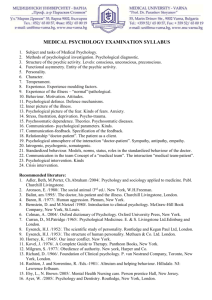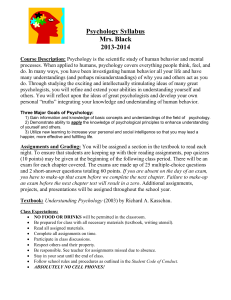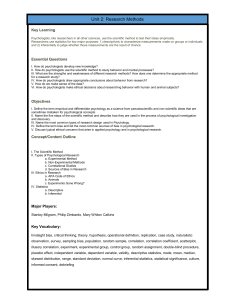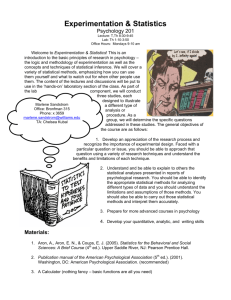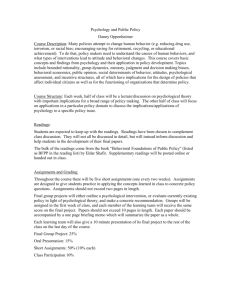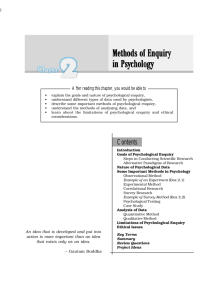AP Psychology Syllabus
advertisement
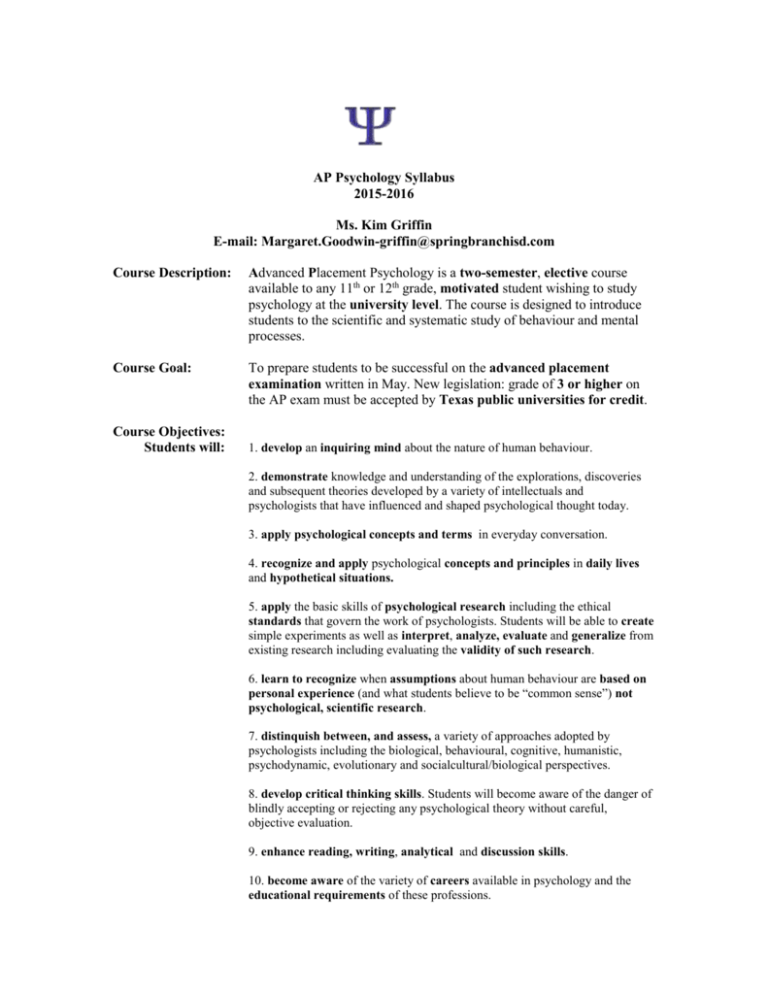
AP Psychology Syllabus 2015-2016 Ms. Kim Griffin E-mail: Margaret.Goodwin-griffin@springbranchisd.com Course Description: Advanced Placement Psychology is a two-semester, elective course available to any 11th or 12th grade, motivated student wishing to study psychology at the university level. The course is designed to introduce students to the scientific and systematic study of behaviour and mental processes. Course Goal: To prepare students to be successful on the advanced placement examination written in May. New legislation: grade of 3 or higher on the AP exam must be accepted by Texas public universities for credit. Course Objectives: Students will: 1. develop an inquiring mind about the nature of human behaviour. 2. demonstrate knowledge and understanding of the explorations, discoveries and subsequent theories developed by a variety of intellectuals and psychologists that have influenced and shaped psychological thought today. 3. apply psychological concepts and terms in everyday conversation. 4. recognize and apply psychological concepts and principles in daily lives and hypothetical situations. 5. apply the basic skills of psychological research including the ethical standards that govern the work of psychologists. Students will be able to create simple experiments as well as interpret, analyze, evaluate and generalize from existing research including evaluating the validity of such research. 6. learn to recognize when assumptions about human behaviour are based on personal experience (and what students believe to be “common sense”) not psychological, scientific research. 7. distinquish between, and assess, a variety of approaches adopted by psychologists including the biological, behavioural, cognitive, humanistic, psychodynamic, evolutionary and socialcultural/biological perspectives. 8. develop critical thinking skills. Students will become aware of the danger of blindly accepting or rejecting any psychological theory without careful, objective evaluation. 9. enhance reading, writing, analytical and discussion skills. 10. become aware of the variety of careers available in psychology and the educational requirements of these professions. Teacher Expectations: This is a university level course. For students to be successful in the course and on the AP exam, they must have an in-depth knowledge and understanding of psychological concepts. To achieve this, students must actively and intellectually engage themselves. Students must read not only the textbook but also any additional research or articles assigned. Students must take responsibility for their learning experience and involve themselves in classroom discussions, activities and assignments. Successful students seek help when they need it. Course Text: Myers, David, Psychology (8th ed.). Students are strongly encouraged to register on line to access Myers’ Psychology for AP (2nd ed) chapter summaries, activities, reviews etc. Note: this is not the textbook we use in class. http://bcs.worthpublishers.com/myersap2e/default.asp#t_924621 ____ Students are also encouraged to register on line with the College Board to access valuable information and resources in preparation for the AP exam. http://www.collegeboard.com/student/index.html?student http://professionals.collegeboard.com/testing/ap/about/changes http://www.apa.org/ Course Requirements: 1. Wide, three-ringed binder (2”- 3”) to keep notes, outlines, articles and handouts in. 2. Smaller three-ringed binder (1 ½”) to keep vocabulary in. This is critical for your course review in May. 3. Loose leaf paper, pen, a highlighter and coloured pencils. Course Grading: 60% Tests (chapter or units): these are modeled on the AP Exam, with multiple-choice questions and one free response. Some major projects/alternative assignments may count as test grades. *10% Participation grade for actively and intellectually engaging in all class activities, discussion groups and staying on task (there is no “bumping” up of grades). 30% All other work which may include: reading quizzes (from the text or assigned articles, often open note), chapter outlines/notes, discussion group, article reviews, chapter vocabulary assignments, answering and analyzing related video snippets, incremental process on research project, critical thinking assignments, demonstrations, other in class assignments or assessment, internet readings, individual and/or group presentations, journal reflections, blogging, and other relevant reinforcement assignments. Projects: Each semester a group or individual will submit or present a major assignment worth 1-2 test grades. See examples below. Final Examination at the end of first and second semester counts 20 % of the semester grade. This is modeled on the AP Exam, with multiple-choice questions and free response essay. Conference Period: I can be found in R207 during my conference period (8th period) and after school. Please contact me via email if you have any questions or concerns. Make Ups: I will follow the Social Studies department test make-up schedule. Make-ups are held Monday after school and Thursday morning before school in designated teacher classrooms or as arranged between the student and teacher. Tutorials: As needed and mutually agreed upon between student and teacher. Please ask! Retest Policy: SBISD/MHS policy attached. Guidelines to follow: Be on time to class. Grade level principals assign detentions. Be prepared for class (have supplies and completed assignments ready) -read assignments, take notes etc…). Give 100% of your attention to the topic or exercise. Get proper rest; you need to be alert and awake to learn. If you miss class, upon returning, find out what you missed and when you need to make up the work. Ask for a tutorial. Be organized. Cell phones and electronic devices must be off and phones placed in designated area. Ask questions. If you have one, the likelihood is great that others share the same query. You are responsible for tests and homework assigned before your absence, be prepared the day you return. . Classroom climate: Respect and courtesy at all times. MHS/SBISD policies: Read your student handbook! Example Projects Include: Natural Observation Students anonymously observe a stranger for 5 consecutive days and document behaviours and individual characteristics and attributes. Students write a paper about their stranger. This assignment not only introduces students to the empiricism and natural observation research method but also makes them keenly aware of the powers of observation and the difference between subjectivity and objectivity. Astrology Analysis Read your horoscope for 10 days. Using a rating scale 1 to 5 rate your horoscopes predictions the day after you read them. Discuss how accurate you believe the horoscope was for you. Discuss the impact that confirmation bias has on one’s belief system and behavior. This assignment allows students to examine the power of belief systems on human behavior. Experimental Research Analysis Each student will select a published psychological experiment of their choice to read, analyze and present to the class in a power point format. This assignment enhances not only the student’s understanding of statistics and the experimental research method but also makes students aware of the depth and magnitude of human behaviours that can be examined. What Was I Like As A Baby Project Students will create a personal developmental visual by initiating a dialogue with parents/caregivers about what they were like as a baby. Students will ask to see baby pictures and to hear memorable stories about their childhood in order to analyze their own development for typical childhood milestones and stages of cognitive, moral and social development according to the theories of Piaget, Erikson and Kohlberg. Research Project Each student or group will identify a reasonable question about human behaviour to investigate. Students will then develop a controlled experiment or study to test their hypothesis. A written proposal outlining methodology, participants and procedures will be submitted following APA research standards and guidelines. Upon the completion of the research, a final summary or abstract will include a statistical analysis of the data and the resulting paper or abstract will potentially be submitted for publish. 3-D Brain Model and Presentation Working in pairs or in a group, students will create a three-dimensional model of some (teacher approved) aspect of brain/body functioning. The model must be realistic, colour-coded and can be taken apart. Students will also create an activity that the audience must participate in during the demonstration. Students will demonstrate their understanding of the workings of the brain/body by presenting their model to the class and being able to answer specific questions from the audience as well as the instructor. Film or Book Review Students can select a book to read or popular film to view (approved by the instructor) and complete a critical analysis of it, using APA documentation, citing supporting evidence of its psychological accuracies and fallacies. Dream Analysis Record your dreams for 10 nights and analyze these using psychological theories and facts. Valentine’s Day Card Create a psychologically accurate card applying concepts learned in class.




